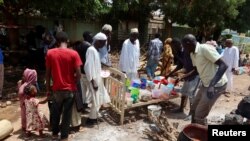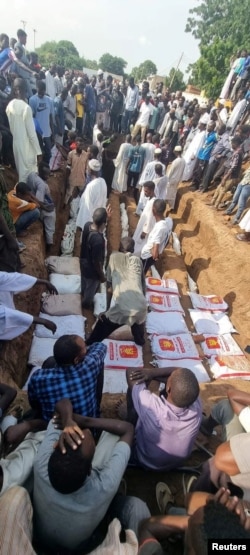While on a quest to solicit support for millions of Sudanese whose lives have been upended by war, a senior U.N. official Thursday warned that the people of Sudan are living on a knife’s edge and are at risk of falling off the cliff if the world does not step up to help them.
United Nations statistics show Sudan has become the world’s fastest-growing displacement crisis since two rival generals plunged the country into war nearly six months ago. Some 5.4 million people are either displaced within Sudan or in neighboring countries as refugees.
“That is an average of more than 30,000 a day, many fleeing with nothing but the clothes on their back,” said Clementine Nkweta-Salami, U.N. resident and humanitarian coordinator in Sudan.
The U.N. official finished a weeklong visit in Geneva, where she met with donor countries as she seeks support for the U.N.’s severely underfunded humanitarian operation in Sudan. To date, the effort has received one-third of the $2.6 billion needed to provide lifesaving assistance for more than 18 million people.
“I have met mothers in Sudan who have told me they do not know where to find the next meal for their children,” Nkweta-Salami said. “I have met families sleeping in makeshift shelters, struggling to find food and water, unable to access health care, their children out of school and the family breadwinners out of work.”
She noted that half of Sudan’s 24.7 million people need humanitarian aid and protection, warning that “conflict, displacement and disease outbreaks threaten to consume the entire country.”
She said people were unable to get health care because 70% of hospitals are not functioning. That, she said, was happening at a time when heavy flooding in the country could “lead to more outbreaks of water-borne diseases” and when a cholera outbreak has been declared in parts of the country.
“Battling a cholera outbreak in a war zone is difficult at the best of times,” she said. “With fighting escalating, it may be near-impossible to control.”
She said she was afraid that the conflict could reach areas like Jazirah State, Sudan’s breadbasket.
“This would have grave consequences for food security,” she said.
The Food and Agriculture Organization said the latest Integrated Food Security Phase Classification report found that “20.3 million people in Sudan face a high level of acute food insecurity, making this one of the most food-insecure countries on the planet.”
To make matters worse, Nkweta-Salami said, the warring parties do not keep their promises.
“Four months ago, the parties meeting in Jeddah committed to de-escalate the fighting, minimize civilian harm and refrain from any disproportionate attacks,” she said. “But since then, the killing of civilians has continued in Khartoum, in Nyala, in al-Fasher, and other areas.”
The Sudan Ministry of Health says 1,265 people have been killed and 8,396 injured since fighting erupted between the Sudanese Armed Forces and paramilitary Rapid Support Forces in mid-April. U.N. agencies believe the actual number of casualties is likely much higher.
The clash between the armed forces also has ignited intercommunal violence in West Darfur, resulting in many casualties, displacements and widespread looting.
Nkweta-Salami said U.N. agencies so far have been able to deliver aid to at least 3.6 million people through two main access points — Port Sudan and from Chad to Darfur.
She said more people could be reached if the efforts were not hampered by bureaucratic obstacles, forced checks of humanitarian trucks and criminal activities, such as the looting of trucks by armed groups.
In both Port Sudan and Darfur, she said, the U.N. must negotiate with various militia for “convoys to move in a safe, unimpeded manner.”
Without a cessation of hostilities and a permanent cease-fire, she said, the conflict in Sudan risks becoming a protracted crisis.
She warned, “There is also a risk that if the conflict is not brought to an end, that it will have a spillover effect in the region. And that is something we must and should avoid.”





